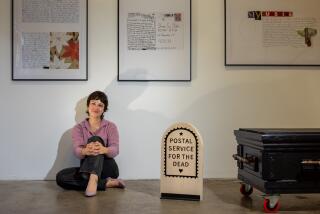Mail Must Arrive for Morale to Thrive
- Share via
Marge Shillington wants nothing more than to have grandson Sean Biggio sitting at her dining-room table in Newport Beach, just like he used to before his Marine Corps reserve unit was sent to Kuwait on Feb. 20.
Failing that, the best she can do is to give him something to read and touch on those long nights in the Arabian desert when the homeland must seem even farther than 7,700 miles away. So she writes him letters and sends him mundane things like socks and underwear and lip balm and hard candy. She sends enough so he can share with his buddies.
Writing letters is what the military brass suggests the families do, and Shillington was more than eager to oblige. The problem is, she and others have heard that few, if any, letters or packages have yet reached the troops.
“They need to know we’re thinking of them, supporting them,” Shillington says, her eyes occasionally welling up. “That’s what we were told to do and we’re doing it, and no one is getting mail. It doesn’t make sense. My whole point is if they want these men and women to be over there, they should find a way to expedite the mail to them.”
Her frustration is understandable. Nothing speaks more clearly about the power of a letter than its calming effect on a young soldier facing combat.
Shillington shows me the handful of letters Biggio has written in his first month. A Costa Mesa High School graduate whose parents and younger brother live in Costa Mesa, he turned 20 in Kuwait.
“Dear Grandma, It’s 4:30 a.m. Sunday here. Any direction you look you see nothing but sand. We had some dust storms two days ago that sucked. We have not yet been told what our mission in this war will be. All I can say is we’ll be coming home with some medals.”
He asks in his letters about the simple things: his nephew’s baseball game, the NCAA tourney, and whether any of his friends have stopped by the house to ask about him.
Shillington’s information about mail delivery comes from Jennifer Miner, wife of the major commanding Lance Cpl. Biggio’s company. Miner e-mailed Shillington and other relatives this week that “as of yet they have not received any letters and may not receive any for a while now. But keep writing anyway.”
Miner tells me the mail is “really backed up” because there are several hundred thousand pieces and because of the security required after the anthrax scare of 2001. In recent days, she says, a few letters -- but no packages -- have trickled in.
“It’s frustrating now,” she acknowledges, “but eventually they will get the mail and they will be very happy to have all this support.” Miner says it’s not uncommon in combat: “They may go for months without getting mail, then get a whole bunch of it.”
That’s tough on families, who can’t help but fret when contemplating how their loved ones spend their days.
Biggio’s family doesn’t have to guess. “This is the last place I would have picked to turn 20,” Sean writes. “Tell Uncle John that we aren’t here for show, and fighting will happen. I can guarantee that. I just can’t say when or where. This is the worst place I can imagine being.”
He asks his parents to “give everyone my address.”
That only frustrates Shillington more; she appreciates the special gift that a handwritten letter represents. “It just makes you feel closer to a person who is reading your letter,” she says. “Sean can say, ‘Grandma is sitting at the dining room table, writing to me. Mom and Dad are in the living room.’ He can visualize in his mind that we’re closer to him because he’s holding something from us.”
*
Dana Parsons’ column appears Wednesdays, Fridays and Sundays. He can be reached at (714) 966-7821, at dana.parsons@latimes.com or at The Times’ Orange County edition, 1375 Sunflower Ave., Costa Mesa, CA 92626.


